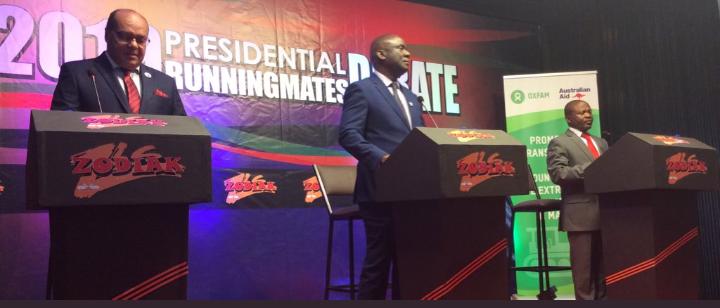


During the second round of the presidential running-mates debate in Blantyre, a question was asked on where the parties are getting their campaign funding. The three candidates; Michael Usi of UTM, Sidik Mia of MCP and Frank Mwenefumbo of UDF, in varying degrees, lolloped through forests of words only to give answers that were, at the very least, hollow and wanting. All the answers, summarized, were variations of a very simplistic response; ‘we have well-wishers’.
Unconvinced, the moderator, Joab Franck Chakhaza posed a follow-up question; ‘is your party ready to reveal the well-wishers?’
Mwenefumbo and Usi were quick to give yet more simplistic, political answers that out-rightly gratified their loyalists, pre-set to wax lyrical of every response that came out of their candidate’s mouth.
‘Our party has nothing to hide.”
But to the neutrals, the closest we got to a candid response came from Mia. Astonishing, because from the onset of the debates, the candidates came across in three distinct ways. There was Mia, a seasoned politician who chose the wording of his answers meticulously to achieve nothing but political mileage for his party. Mwenefumbo was the man exuding a certain comprehension of policy and government business. And there was Usi, the man striving to strike a connection with the common man by constantly distancing himself from the ‘politicians’ tag, almost forgetting that he was in fact vying for a political position.
The audience could therefore be forgiven for expecting Mia to give a hollow answer too, as long as it glorified the MCP. But when quizzed, Mia at first appeared unconvinced as his audience of whatever was coming out of his mouth. It took him a good few seconds to finally settle on something he could say with conviction.
“We have no problem revealing our sponsors,” he started and paused, perhaps words-searching. “But see, ever since I joined MCP, I have had MRA all over my businesses a couple of times”. He said.
And therein, the last part of Mia’s response lies the underlying problem, the obstacle to the efficacy of Sections 27-31 of the Political Parties Act, and a microcosm of the state of our political landscape.
Eloquence may not be his best skill, Mia, but one could not miss the point he was making. In Malawi’s political environment, a business person cannot openly declare support to an opposition party without courting repercussions costly to the business. Despite Malawi now having laws guiding political parties and their financing, the environment remains just too toxic for opposition political parties.
The Political Parties Act of 2018 was among others, enacted to provide guidelines for political parties’ financing. Section 27 (2) of the act reads;
A political party may, for purposes of financing its activities, appeal for, and receive donations from any individual or organization, within or outside Malawi, provided the source of every donation, whether in cash or in kind or whether once off or cumulatively, with a monetory value of at least 1 million from an individual donor and of at least 2 million from an organization, shall, within 90 days of its receipt, be declared to the Registrar by the political party concerned.
This law was enacted to ensure transparency and accountability. By knowing who is funding political parties and their interests, the state can safeguard its interests and avoid situations where individuals hold it hostage. The idea is to avoid individuals/organizations bankrolling a candidate on quid-pro-quo, where the candidate is obliged to return the favour by compromising the integrity and the interests of the state once voted into power.
In an ideal world, laws such as these are created to be enforcers of hallmarks of uprightness. But in a country where the law is applied selectively based on who is on what side of it, Mia’s concern should not be taken lightly. Since it is an unwritten law in Malawi that parastatals and institutions of good governance operate to the whims of the ruling party, it is not entirely absurd to doubt the efficacy of this legislation, regardless of its noble intents.
For this act to succeed, there first needs to be an environment where state institutions are not compromised by the ruling party. The Registrar of Political Parties should be liberated from any political influence, and the MRA should not be used as a tool for stifling the opposition. Individuals/organizations will then have no qualms declaring their support for a political party of their choice.
Until such an environment is realised, political parties’ financing will always be a myth confined to guess-work and speculation. Claims that a political party is siphoning money from public coffers will remain a feature in our politics, and achieving transparency, accountability and fraud and corruption-free nation will remain wishful thinking.
– The News Monger